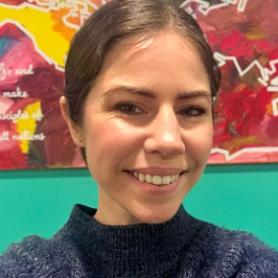 From the Border: Powerful Partnerships Bearing Fruit from Burden
From the Border: Powerful Partnerships Bearing Fruit from Burden
Powerful partnerships between Anglican churches are bringing Christ’s love to some of the most vulnerable communities.
Since the military coup in February 2021, fighting has intensified in Myanmar between the military and insurgents. It continues to have widespread, devastating effects across the country, including severe economic hardship, shortage of health services, and people unable to meet their basic needs. These hardships are particularly acute for the Karen minority, a marginalised Christian people group who also face persecution and have few options for earning an income. Karen and Karenni states have seen some of the most intense levels of fighting, displacement, and humanitarian need in the country.
There are tens of thousands of Karen people internally displaced in Myanmar or living as refugees along the Thai-Myanmar border. New waves of refugees are prompted by flair-ups in the fighting and aerial strikes. Many flee into the jungle and then make their way to refugee camps like Mae La for safety. Mae La is the largest of nine refugee camps in Thailand, hosting around 34,000 refugees of all religions.
Through ARDFA, churches from the Melbourne and Bendigo Dioceses, and St. Alban’s in WA, have been loving the Karen people in their plight, supporting the Diocese of Hpa-an in partnership with the Mothers Union (MU) and Karen Anglican Ministry at the Border (KAMB), a group of churches established on the Thai- Myanmar border area by Anglican evangelists. KAMB aims to show Christ's love as they help people in need, so as to “bear one another’s burdens and so fulfil the law of Christ” (Galatians 6:2).
Though their resources are limited, KAMB has worked tirelessly to bring relief to those displaced along the border, including remote areas of the jungle, who often lack food, clean water, and other essentials. They also play a major role in caring for new refugee arrivals into Thailand, many of whom experience trauma and are left desolate after having to flee their homes so quickly. These new arrivals come with very little yet need to be able to support their families to survive.
These ministries move beyond simply meeting immediate needs. They’re also securing more lasting and holistic transformations and building sustainability in the lives of the Karen. In Myanmar, ARDFA’s plantation project in the remote village of Htee Ka Haw has provided the local people with the resources they need to generate income. In Thailand, land was purchased for St Luke’s Toh Ta Anglican Church with help from the Bendigo Cathedral. ARDFA raised funds to build a kitchen and dining hall that is serving the church and its community. The annual School of Biblical Theology Conference has seen Karen Christians strengthened for ministry with training in preaching, leadership, and teaching, assisted over the years by the Rev Marc Dale and other visiting teachers from Australia.
By helping new arrivals in Thailand to start microenterprises, refugees are empowered to provide for their families, become self-sustaining, and maintain their independence and dignity.
Naw Kyi Kyi Win rejoices that, “by the grace of God, the project is going well! As we help the people in need, we serve the Lord.” She is one of the many Christians who are serving the refugee community through the New Arrivals Project.
From his recent visit, the Rev Marc Dale from St. Alban’s Anglican Church, WA, reports that “when they arrive they get a month of food and capital… People have been set up with animal husbandry; weaving has been successful too. There are many food stalls - the camp is so big, it is its own economy!” In this bustling camp, Naw Toe Pwae’s ducks are multiplying. Meanwhile, Naw Mu Phaw received 500 Baht ($20 AUD) for one shirt that she had woven, which is helping to meet her family’s needs. On the profits of his family’s weaving, Saw John Htoo Say was able to build a house. Saw Poe Law Eh bought a guitar with his start-up capital and now has 20 people attending his music class.
Some of his students are now serving in the church worship band. Saw Nu Say is making cement stoves and selling them. Naw Ray Htoo attempted to expand her shop to sell drinks. It worked, and now she is sewing clothes as well, having leased a sewing machine from St. John’s MU for 200 Baht.
Life in a refugee camp is difficult for anyone, but for people with a disability, the challenge is compounded. Tragically, when he was just one month old, Saw Eh K'tu Moo (now 28) became very sick and lost the use of his legs. He walks on his knees and uses both hands to move about. Using the toilet is most difficult, as he has to go downstairs and outside. It is particularly hard for him during the rainy season. Our partners at St. John’s church report that, “his mother brought him to Mae La for safety as he cannot run when something happens. She went back to Myanmar to bring the other children."
The next development in ARDFA’s work is to improve the daily lives of refugees with disabilities. Support includes nutritional food, toiletries, medication, disability aids, accessible toilets suited to their needs, and assistance to attend regular medical appointments. Yet, amongst the hardship, ministry is fruitful and there is much to praise God for. The vulnerable are being cared for by brothers and sisters they’ve never met. Christians are supporting and serving one another as they rebuild their lives. Churches are being strengthened and evangelism is everywhere. People are coming to faith and are being baptised. Refugees are turning to Christ as they encounter Christians, witness their faith, and receive gospel-motivated love. Please keep Myanmar, its people, and our partners in your prayers.
Jessica Boone,
Anglican Relief and Development Fund Australia
